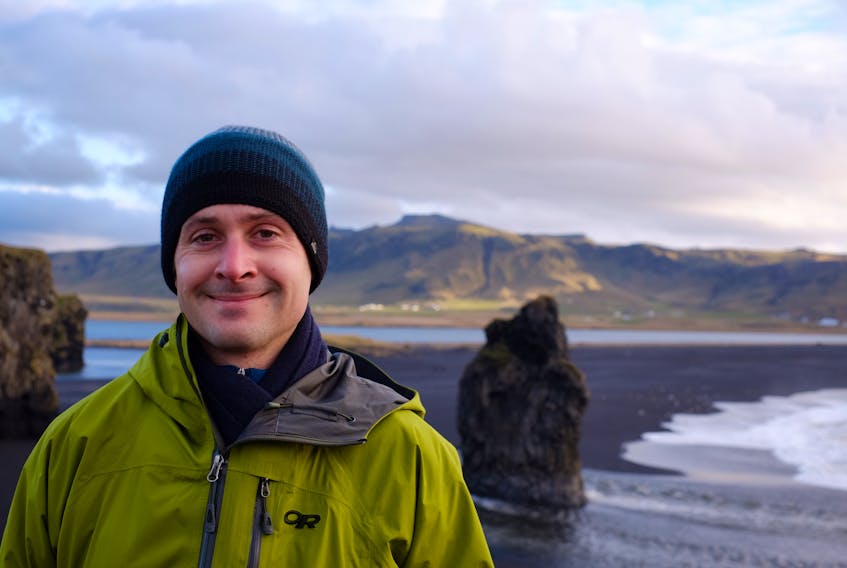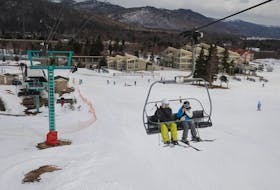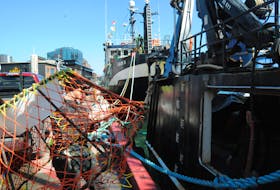When it comes to balancing the interests of oil development and eco-tourism, a Memorial University prof says Newfoundland and Labrador may want to consider following the lead of some countries located on the opposite end of the Northern Atlantic Ocean.
Mark Stoddart, a faculty member with MUN's sociology department, is the co-author of a new academic book called "Industrial Development and Eco-Tourisms: Can Oil Extraction and Nature Conservation Co-Exist?"
It compares how Newfoundland and Labrador and countries sharing the North Atlantic balance deriving economic benefit from an industry devoted to resource extraction and another based on natural environments and wildlife encounters with whales, seals and seabirds.
Stoddart previously looked at the promotion of sport and leisure activities in Newfoundland and Labrador's tourism sector as part of his academic research and has studied climate change from a sociological perspective for over a decade. He's also had a long-term interest in energy policy and oil development.
"The book really became a place to draw those three different interests together and think more and more about these two forms of development that we often don't think of in the same political conversations or cultural spaces," Stoddart said. "But they do share social and ecological spaces that are related in a bunch of ways that might be a little more under the surface or less obvious a lot of the time, with climate change creating a context for where the development of coastal societies around the North Atlantic is going in the future."

North Atlantic neighbours
More often, comparative research involving Newfoundland and Labrador or Canada tends to focus on North America. Stoddart however felt it made sense to look at the province's marine proximity in relation to neighbours bound by the North Atlantic.
"Maybe one of the more novel things about the book is it grew out of my own interest of just having had the chance to spend a bit of time in Norway and Denmark originally and then thinking there would be some really interesting comparative lessons potentially to draw from looking at Scotland, Iceland, Norway and Denmark in comparison to our region," said Stoddart, who was the principal investigator for a five-year Social Sciences and Humanities Research Council grant that supported field research for the book.
Of the places studied, Stoddart suggests Scotland best allows the two industries to co-exist on equal footing. Scotland's nature-based tourism sector is a century old, while its oil and gas industry really began to emerge in the 1970s.
"It's probably the best example of where the two of them co-exist on a bit more of an equal footing — where one doesn't necessarily overshadow the other politically. (Not) as much as we might see in Norway, where oil is much more important to the national political economy and where tourism is much more of a regional importance to particular parts of the country. It's a bit more localized," he said.
"The flipside of that would be Iceland, which was really in just the exploratory phases of oil development before the 2014 price crash. At this point, the exploration licences have all expired and nobody is really that active in that region, in northeast of the country. And then at the same time, they really had the tourism boom taking off there since 2012."
Denmark’s shift
Meanwhile in Denmark, Stoddart has noticed a rapid and aggressive shift towards renewable energy development complemented by a thriving tourism economy (which, like most other places, is now feeling the effects of the COVID-19 pandemic).
Stoddart views Newfoundland and Labrador as more oil-oriented compared to the other regions studied in the book.
"Our tourism development has picked up a lot in the last 20-plus years," he said. "But I think it's still politically very much overshadowed by the oil economy here and the oil sector here in terms of governance. We still very much think of tourism governance mostly in terms of promotion and marketing, not necessarily in building the types of sustainable tourism we want to see long-term and how government might support that or bring in policies that can help implement that."
As a result, Stoddart believes the provincial tourism sector is underdeveloped compared to what it could be. He also noted there's a lack of conversation between the two sectors, and that's not just the case for Newfoundland and Labrador.
"Something we see across the cases is we don't really tend to see conversations between the two sectors until points of conflict emerge," he said. "Here, we've probably mostly seen that around proposals for hydraulic fracturing over in Sally's Cove and western Newfoundland, around Gros Morne, where that's actually become a point of conflict ... I think if tourism development is taken more seriously, then maybe it has more of a voice when we're talking about landscape planning, seascape-level planning and what's appropriate to go where."

Public investment
Stoddart would also argue Nordic countries like Denmark and Norway have done a much better job than Newfoundland and Labrador when it comes to using public investment to foster technical expertise that can be exported to other countries and sectors and steer those countries towards transitioning to renewable energy.
"When I was doing field work in Denmark a few years ago in the town of Esbjerg — which is the main oil-hub city for the country, very comparable to Calgary or St. John's — meeting people in the city government, we were talking about the expansion of offshore wind there. It was happening so rapidly that it was actually offsetting a lot of the economic negative impacts of the volatility and price declines post 2014 (in oil and gas)," he said.
“It's become one of the main ports for North Sea offshore wind installation, and a lot of that was driven by public involvement in the sector by government and ownership and investment in the sector. That's actually made Denmark a real leader in implementing corporate, environmental and social responsibility in its oil sector."
Esbjerg is located in the middle of Wadden Sea National Park, a major tourism attraction in western Denmark.
"The two sectors there actually live together quite well side-by-side and see each other as good neighbours, as one of my participants put it," Stoddart said. "I think that's partly because there is more ongoing confrontation across the sectors, but also more of a sense that the energy sector is being managed with an eye towards renewable transitions and towards what a more sustainable future will look like."

More discussion
One of the big arguments the book makes, according to Stoddart, is to push for more discussion about environmental planning at a landscape and seascape level.
"These are sectors that potentially share social and ecological space. We need to be thinking of them in the same conversations," he said, adding fisheries, an industry not covered in this book, would also have an obvious stake in the matter economically.
"The longer we leave those discussions, the harder it's going to be to catch up with our North Atlantic neighbours."
"Industrial Development and Eco-Tourisms: Can Oil Extraction and Nature Conservation Co-Exist?" is published by Palgrave Macmillan and co-authored by Stoddart, Alice Mattoni and John McLevey. A summarization of the book's policy and practice conclusions can be accessed for free at academia.edu.
Twitter: @CBNAndrew









